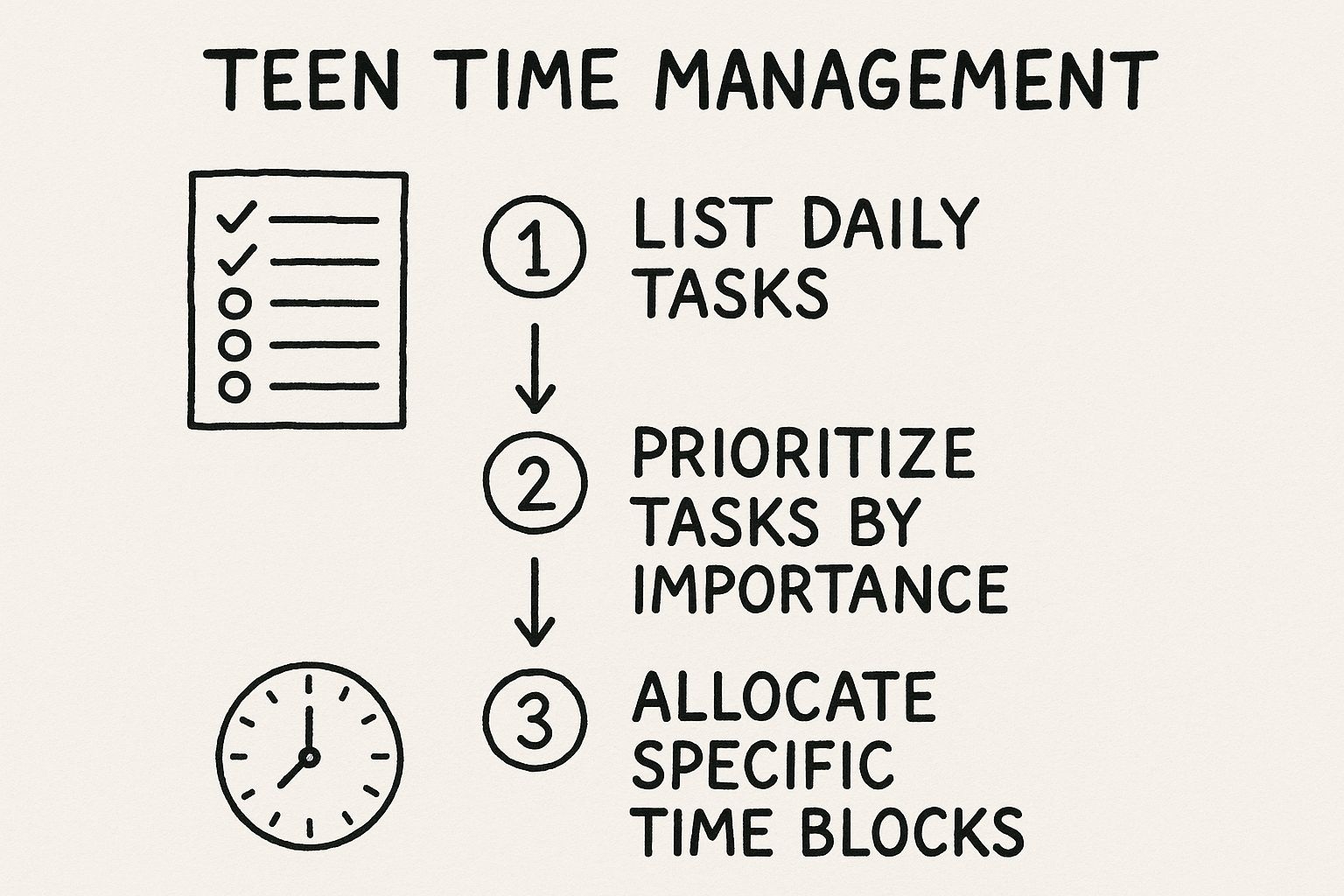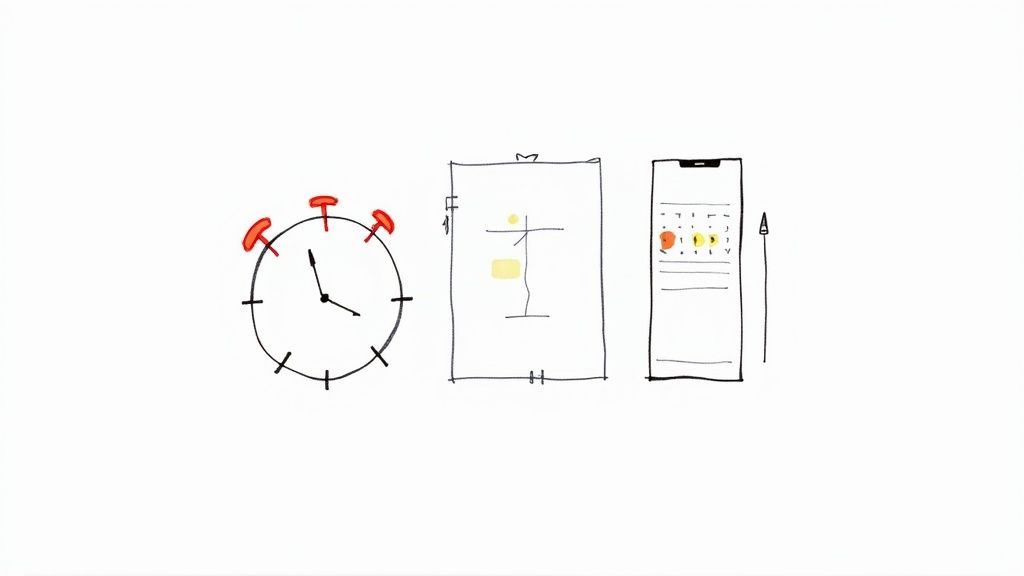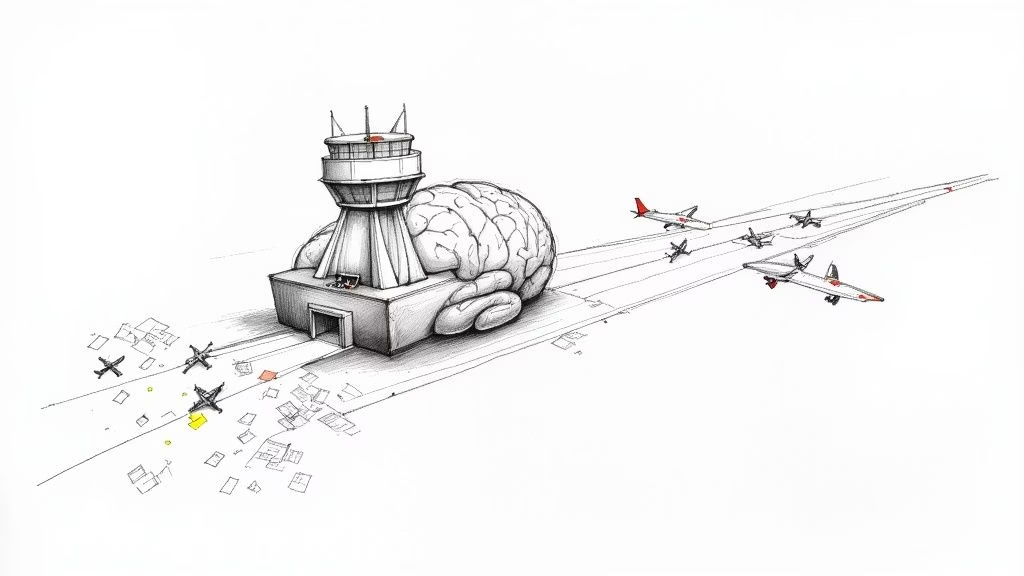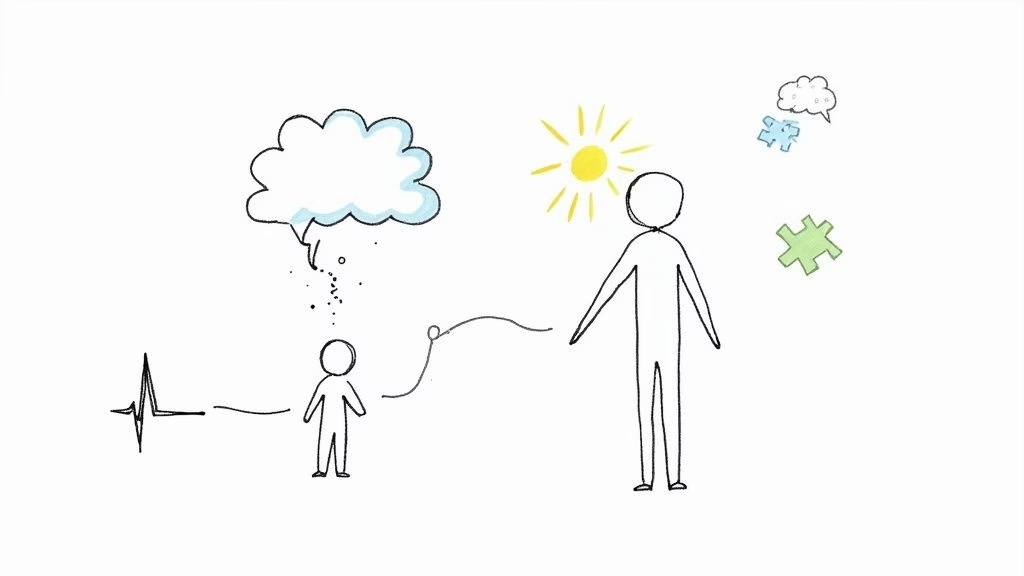Let’s be real—managing time as a teenager today is less about following a rigid, minute-by-minute schedule and more about building smart systems and healthy habits that actually work. With school, a social life, and the constant buzz of a phone, it takes a flexible approach that acknowledges the unique pressures teens are under. The goal is to feel understood, not just managed.
Understanding the Modern Teen Time Crunch

Today’s teens are navigating a world that’s more complex and demanding than anything previous generations faced. The pressure is coming from all sides—tough academic expectations, a packed schedule of extracurriculars, social obligations, and the ever-present pull of their digital lives. It’s a constant balancing act that can leave even the most organized kid feeling completely overwhelmed.
This isn’t just about laziness or procrastination. More often than not, a teen’s struggle with time management is a symptom of something deeper, like anxiety about school or the fear of missing out. When a teen puts off a huge project, it’s rarely because they don’t care. It’s usually because they feel paralyzed by the sheer size of the task and have no idea where to even begin.
The Digital Dilemma
One of the biggest hurdles is the constant digital connection. Technology offers incredible tools for learning and socializing, but it’s also a massive challenge to focus and productivity. The endless stream of notifications from social media, games, and messages creates a state of “continuous partial attention,” making it nearly impossible to engage deeply with any single task.
The numbers don’t lie. By 2025, the average teen is projected to spend about 7 hours and 22 minutes on screens every single day. For a lot of kids, especially teen boys, that number is even higher. This digital immersion eats up a huge chunk of their waking hours, often at the expense of homework, hobbies, and even sleep. If you want to dig deeper, you can learn more about the research on teen screen time and what it means for families.
The goal isn’t to demonize technology but to help teens build a healthier relationship with it. Understanding its impact is the first step toward creating boundaries that support both their well-being and their academic success.
Why Systems Matter More Than Willpower
For many teens, especially those with ADHD or other executive function challenges, simply “trying harder” is a dead-end strategy. As an engineering student with ADHD, I learned this the hard way. My success depended entirely on the systems I built for myself. Having an organized space and putting in the prep work ahead of time saved me from countless hours of stress and last-minute panic, especially when it came to studying.
This is where parents can make a real difference—not as micromanagers, but as supportive coaches. Helping your teen build a simple system for tracking assignments, organizing their study area, or planning their week can be a game-changer. It shifts the focus from battling procrastination to creating an environment where getting things done feels natural and achievable.
To get started, here are a few foundational strategies you can implement right away. Think of this as the basic toolkit for getting a handle on time.
The Teen Time Management Starter Kit
| Strategy | Quick Action | Why It Works |
|---|---|---|
| The Weekly “Brain Dump” | Every Sunday, spend 15 minutes writing down everything that needs to get done for the week—assignments, chores, practices, etc. | It gets overwhelming thoughts out of their head and onto paper, making tasks feel more manageable and less abstract. |
| Time Blocking Basics | Pick the top 3 priorities from the brain dump and schedule specific, 90-minute blocks in a calendar to work on them. | It dedicates focused time to important tasks, preventing multitasking and ensuring progress is made on what matters most. |
| “Eat the Frog” First | Identify the one task they are dreading the most and tackle it first thing after school. | Completing the hardest task first creates momentum and reduces the anxiety that fuels procrastination for the rest of the day. |
These aren’t complicated, but they create structure where there might be chaos. By starting with these simple systems, you’re giving your teen a framework they can build on as they figure out what works best for them.
How to Build a Personal Time Management System
Let’s be real: the secret to managing your time as a teen isn’t about suddenly developing superhuman willpower. It’s about building a solid, reliable system that actually works for you.
For many people, especially those with ADHD, having a good system is everything. It takes the guesswork out of what to do next and lowers the mental energy you need just to get started. It’s the foundation for tackling school, staying motivated, and finally beating procrastination.
Building that system starts with your environment. An organized space can save a surprising amount of time and cut down on distractions. Think about it—if your desk is clear and your notes are in the right folders, you can jump straight into studying instead of wasting 20 minutes hunting for a textbook. The prep work you do to create an organized system saves you so much time later.
This visual breaks down the basic steps for getting your priorities in order.

See how it flows from just listing tasks to actually blocking out time? That simple process can bring a ton of clarity to a chaotic schedule. It turns that vague, overwhelming feeling into a concrete plan you can actually follow.
Create Your Command Center
First things first: you need a “command center.” This is your dedicated spot for all things schoolwork. It’s not just about having a desk; it’s about setting it up for pure focus.
- Kill the Distractions: Keep only the essentials within arm’s reach. Your phone, game controllers, and anything else that pulls your attention away should be out of sight—ideally in another room entirely.
- Organize Your Gear: Use folders, binders, or even digital tools like Notion to sort your notes for each class. When everything has a home, you get rid of the physical clutter and the mental stress that comes with it.
- Prep for Tomorrow, Today: Take five minutes before bed to pack your backpack and lay out whatever you need for the next day. This tiny habit saves a massive amount of brainpower in the morning rush.
For teens who are serious about taking control of their schedules, understanding the pieces of building a comprehensive time management system is a game-changer for getting more done.
Choose Your Planning Tool
The best planner is the one you’ll actually use. Seriously. Don’t feel pressured into a complex app if a simple notebook feels right. The key is to experiment and find what fits your brain.
- Paper Planners: These are awesome for visual learners. The physical act of writing something down can actually help you remember it and feel more committed to it.
- Digital Calendars (Google Calendar, Outlook): Perfect for setting reminders that pop up on your phone and for sharing schedules with family. Color-coding classes and activities gives you a quick, clean overview of your week.
- Task Apps (Trello, Asana): These are great for breaking down huge projects (like that monster history essay) into smaller, bite-sized steps. Dragging a task from “To-Do” to “Done” is also incredibly satisfying.
A system isn’t about being rigid; it’s about creating enough structure so you can have more freedom. When you know your priorities are handled, you can actually relax and enjoy your downtime without that nagging guilt about what you should be doing.
By putting these simple structures in place, you make it so much easier to just get started. And that’s half the battle against procrastination. For more strategies designed specifically for teens, check out our guide on time management for teenagers.
Proven Strategies to Overcome Procrastination

Let’s get one thing straight: procrastination is rarely about being lazy. For most teens, it’s a natural response to feeling totally overwhelmed, anxious about school, or paralyzed by the fear of not doing a perfect job. Once you understand that, you can shift from a place of frustration to one of action.
This isn’t just a hunch. The struggle is real and widespread. Research shows that procrastination impacts about 75.5% of students, which can seriously throw a wrench in their productivity. A big reason for this is that an estimated 82% of people don’t use any formal system to manage their time, leaving them open to constant interruptions and wasted effort. You can see the time management stats for yourself and realize you’re not alone in this.
The only way to break the cycle is to tackle the mental hurdles head-on, not just rearrange a to-do list. When a big project feels too intimidating to even start, the brain’s defense mechanism is to just… not.
The Power of Chunking and Mindfulness
One of the best ways I’ve found to dismantle that feeling of dread is the chunking method. Instead of staring at a massive ten-page research paper on your to-do list, you break it down into ridiculously small, achievable steps.
Your list might look something like this:
- Spend 15 minutes brainstorming topic ideas.
- Find five credible sources online.
- Write a one-paragraph outline.
- Draft just the introduction.
See what happened there? You turned a mountain into a series of small, manageable hills. Each tiny “chunk” you complete gives you a little win, building momentum to tackle the next one. It makes starting the climb so much easier. For a deeper dive into breaking these habits, our guide on how to stop procrastinating has even more practical tips.
Mindfulness is another game-changer. When your stress and anxiety are through the roof, your ability to focus tanks. A simple meditation practice can help quiet the mental noise and hit the reset button on your focus.
A Simple Meditation Guide for Teens
You don’t need a special cushion or an hour of silence. Seriously, just five minutes can make a massive difference in how you handle stress and concentrate on schoolwork.
- Find a Quiet Spot: Sit comfortably in a chair, feet flat on the floor, or lie down.
- Set a Timer: Start with just three to five minutes. That’s it.
- Focus on Your Breath: Close your eyes and just notice the feeling of your breath moving in and out. Don’t try to change it, just observe it.
- Acknowledge Your Thoughts: Your mind is going to wander. That’s what minds do. When it happens, just gently notice the thought without judgment and guide your focus back to your breath.
This practice isn’t about emptying your mind; it’s about learning to redirect your attention on command. Over time, this skill becomes a superpower for studying and any other task that requires focus.
This isn’t just about getting homework done. It’s about building a toolkit of mental strategies to conquer the psychological barriers that get in the way of success and well-being.
Mental Health Resources for Teens
For many teens, especially young men, procrastination and a lack of motivation can be tied to deeper mental health struggles. According to research from the CDC, nearly 1 in 3 high school students reported poor mental health in 2021. It’s so important to know that asking for help is a sign of strength, not weakness.
Here are a few great resources that offer support, community, and guidance.
Mental Health and Motivation Resources for Teens
| Resource Type | Organization / App Name | What It Offers |
|---|---|---|
| Crisis Support | The Trevor Project | Provides 24/7 crisis intervention and suicide prevention services for LGBTQ young people. |
| Peer Support | Man Therapy | Uses humor to destigmatize mental health conversations and offers resources for men. |
| Mindfulness App | Calm | Offers guided meditations, sleep stories, and breathing programs to reduce anxiety and stress. |
These organizations are there to help you navigate the tough stuff, so you can get back to feeling like yourself.
How Parents Can Support Their Teen’s Success
Helping your teen manage their time is a tough balancing act. The goal is to shift from being a micromanager—the parent who nags about every late assignment—to becoming a supportive coach. It’s about empowering them to build their own skills.
This shift does more than just get homework turned in on time. It builds their autonomy, cuts down on conflict, and genuinely prepares them for the future.
But first, you have to understand the why behind their struggles. Procrastination isn’t usually the real problem; it’s a symptom. It’s often tied to bigger things, like anxiety about grades, feeling totally overwhelmed by a huge project, or even ADHD, which makes executive functions like planning and organizing a real challenge.
Instead of jumping straight to a lecture when you see them putting off a big paper, try asking something like, “That project seems like a lot. What’s the hardest part about getting started?” This opens a door to a real conversation, not another argument.
Fostering Motivation and Open Communication
Real motivation doesn’t come from nagging or pressure. It has to come from within. The key is helping your teen connect their daily grind to something they actually care about.
Talk to them about their long-term goals. Maybe it’s getting into a specific college, saving up for a car, or just having more free time for a hobby they love. When they can see how finishing their history homework connects to that bigger picture, the motivation starts to build on its own. You can find more strategies for how to motivate teens by digging into what truly drives them.
Then there’s the screen time battle. It’s a huge challenge when their entire world is connected. The average American spends over 7 hours a day staring at a screen, and for teens, that number is often even higher. This habit can start incredibly early—nearly half of kids under two use smartphones—making it that much harder for teens to unplug. You can discover more insights about screen time stats and how they impact focus.
Instead of laying down strict rules that just lead to fights, try working on a solution together. Sit down and create a family media plan. This could be as simple as making the dinner table a tech-free zone or setting up a central charging station where everyone’s phone goes at 9 PM.
Resources for Struggling Teen Boys
For some teen boys, societal pressure makes it incredibly difficult to admit they feel overwhelmed or anxious. They might hide their struggles behind a mask of apathy or defiance. It’s so important to create a safe space where they know they can open up without judgment.
It’s also crucial to know where to find outside support. Connecting young men with positive role models and communities can be a game-changer.
- Men’s Groups: Organizations like The ManKind Project offer youth programs that provide mentorship and a community for young men to build emotional intelligence.
- Mindfulness and Meditation: Apps like Calm or Headspace have guided meditations specifically for teens. It’s an accessible way for them to learn how to manage stress and improve their focus on their own terms.
- For Young Men: The Jed Foundation’s mental health resource center offers specific guidance and support tailored to the unique challenges faced by young men.
When you act as a supportive partner, you’re not just helping your teen build better habits. You’re giving them the confidence and resilience they need to manage their life long after they’ve left home.
Essential Resources for Teen Boys and Young Men

Let’s be real: society puts a lot of pressure on teen guys and young men. It can feel almost impossible to talk about being stressed, overwhelmed with school, or just feeling unmotivated. But finding healthy outlets and people who get it is a huge part of learning to be resilient and mastering teens time management.
It’s so important to make asking for help a normal thing, not a sign of weakness. For a lot of young men, the fear of looking like they don’t have it all together is the very thing that keeps them stuck in cycles of procrastination or anxiety. These things are almost always connected.
Building a Real Support Network
Having a solid support network isn’t just about having a few good buddies. It’s about finding communities where you can actually have honest conversations without feeling judged. This is where mentorship and peer groups can be absolute game-changers, offering a safe space to work through challenges.
- Men’s Groups: Organizations like The ManKind Project run structured programs for young men that are all about mentorship and emotional growth, helping them navigate that tricky transition into adulthood.
- Peer Communities: Groups like EVRYMAN are great because they teach practical emotional tools in a straightforward way. It’s about connecting with other guys and learning how to manage stress effectively.
These groups aren’t therapy in the traditional sense. They’re about building community and learning real-life skills. On the academic side, using the right tools can make a huge difference, too. An AI Essay Analyzer for Academic Support can help you sharpen up your writing and get a handle on homework, which frees up a ton of mental space.
Learning to manage your time is as much about managing your head and your heart as it is about organizing a calendar. Finding the right support system is a powerful first step toward getting a handle on both.
Tools for Mental and Emotional Fitness
Just like you’d go to the gym to build muscle, your mental and emotional well-being needs consistent effort. You don’t need to do anything drastic; simple, daily practices can make a world of difference in your ability to focus and handle whatever life throws at you.
A short meditation practice, for instance, can be a game-changer for cutting through stress. Seriously. It just takes a few minutes of focused breathing to quiet your mind and sharpen your concentration.
A 3-Minute Meditation for Better Focus:
- Find a comfortable spot to sit and close your eyes. Set a timer for three minutes.
- Just focus on the feeling of your breath coming in and going out. Nothing else.
- Your mind will wander. That’s what minds do. When it happens, just gently bring your attention back to your breath. No judgment.
This simple exercise is like a workout for your brain. It trains your ability to redirect your focus, a skill that pays off big time when it comes to studying better and procrastinating less. It’s a practical tool for any young man looking to build mental strength and improve his teens time management.
Your Questions on Teen Time Management Answered
Navigating the world of teen time management brings up a lot of questions for parents and teens. It’s tricky territory. Let’s tackle some of the most common challenges with real-world answers to help you find what actually works for your family.
How Can I Help My Teen Who Gets Distracted by Their Phone?
The phone. It’s often the single biggest hurdle to getting homework done. An all-out ban usually just sparks a fight, so the real goal is to build structure and boundaries that everyone can agree on.
One of the most effective things I’ve seen work is creating designated phone-free study times. This could be a 90-minute block where all phones go to a central “charging station” outside the bedroom. Just getting the phone out of their immediate space works wonders and dramatically cuts down the temptation to check every notification.
The key isn’t just taking the phone away; it’s replacing a distracting habit with a structured, focused one. By creating a physical distance, you lower the mental energy your teen has to spend resisting the urge to scroll.
You can also explore focus apps together. Tools like Forest or Freedom can temporarily block distracting websites and apps, turning their own tech into an ally for concentration instead of an enemy.
What Is the Best First Step if My Teen Is Completely Overwhelmed?
When a teen is totally swamped, trying to fix everything at once is a recipe for disaster. A complete schedule overhaul just piles on more stress and leads to burnout. The best approach? Start small and build momentum.
Pick one single, tangible thing to organize. It could be as simple as cleaning out their backpack on Sunday night or just planning out the next day’s homework. That’s it.
By focusing on one small win, the whole process feels achievable. This builds confidence and proves that they can get organized, which makes it easier to tackle bigger challenges later. It shifts their mindset from “I can’t do any of this” to “Okay, I handled that. What’s next?”
Are Digital Planning Tools Better Than Paper Planners?
Honestly, there’s no single “best” tool. The right planner is simply the one your teen will actually use consistently. Both digital and paper have their own strengths, and the choice really comes down to what clicks with their personality and learning style.
- Digital Tools (Google Calendar, Trello): These are great for setting automatic reminders, sharing schedules with family, and easily moving things around. Perfect for teens who are already glued to their devices.
- Paper Planners (Notebooks, Wall Calendars): For some people, especially visual and kinesthetic learners, the physical act of writing things down makes a huge difference in memory and commitment. Seeing the entire week laid out on paper can also make planning feel more real and concrete.
Let them experiment. They could try a digital calendar for a month, then switch to a paper planner to see what feels more natural. The goal isn’t to find a perfect system on day one, but to find one that reduces friction and makes staying organized feel a little more effortless.
If your teen is still struggling to build these habits, one-on-one coaching can provide the personalized structure and support they need. Andrew Petrillo Life Coaching helps teens and young adults develop the exact systems and mindset needed to conquer procrastination, manage stress, and thrive academically.
Learn more about how coaching can unlock your teen’s potential.



















